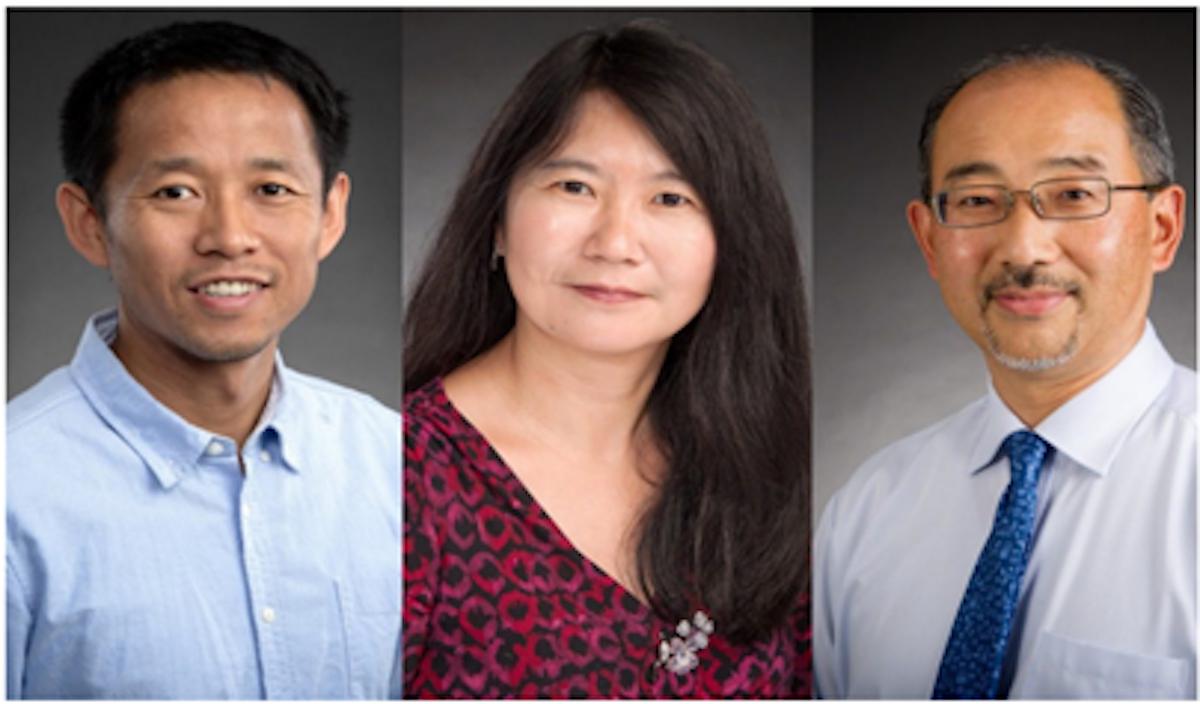Co-corresponding authors of the Cancer Discovery paper on the St. Jude survivorship portal (L to R): Xin Zhou, PhD, Jinghui Zhang, PhD, and Yutaka Yasui, PhD. Photo courtesy of St Jude Children’s Research Hospital
New data platform incorporates clinical and genomic information from thousands of cancer survivors
SCIENTISTS from St. Jude Children’s Research Hospital have announced the first data portal for sharing and analyzing pediatric cancer survivorship data. The portal integrates data involving whole genomic sequencing, treatment exposure and outcomes — creating an unprecedented research system that houses 400 million genetic variants from over 7,700 childhood cancer survivors.
The portal is free to use and open access as a part of the St. Jude Cloud ecosystem. Research at St. Jude has been instrumental in increasing childhood cancer survival rates over the past 61 years, and today approximately 85 percent of childhood cancer patients in the U.S. are successfully treated and alive five years post-diagnosis.
This growing population of survivors is at risk of developing a wide range of adverse health effects that can be linked back to their cancer or its treatment. Such outcomes include premature mortality, organ dysfunction, secondary cancers and psychosocial challenges, among others. By studying this unique population of childhood cancer survivors, investigators can gain insight into how to best tailor therapy up-front and provide screening and support later in life to avoid adverse outcomes.
“With the portal, with just one click, you can make new discoveries,” said co-corresponding author Jinghui Zhang, PhD, St. Jude Department of Computational Biology. “In the past, people would spend weeks downloading, analyzing, organizing and summarizing data into figures — now you can do all that in just minutes.”
Some new findings from the data in the Portal include:
- Platinum chemotherapy has been used for decades to treat cancer and is known to cause hearing damage, but the data in the portal were able to show that not all types cause the same amount of damage.
- Gene mutations are associated with placing cancer survivors of African ancestry at greater risk for developing heart disease later in life.
- A novel association was discovered between mental health, age and limb amputation. Receiving an amputation at an older age (teenage compared to earlier childhood) is associated with increased resilience against poor mental health.
“There are half-a-billion clinical data points in the portal, hundreds of terabytes of genetic data supported by dynamic and interactive visualization analysis,” said Xin Zhou, PhD, St. Jude Department of Computational Biology.
“We aren’t just sharing data,” said Yutaka Yasui, PhD, St. Jude Department of Epidemiology and Cancer Control. “We are facilitating the analysis and visualization of data and making it free to anyone — that’s a tremendous resource for the cancer survivorship community.”
About 15,000 children are diagnosed with pediatric cancer each year in the United States. The most common childhood cancers include leukemia, lymphoma, and brain tumors. However, there are over 100 different types of cancers that occur in children.
Danny Thomas, the son of immigrant Lebanese parents, founded St. Jude in Memphis in 1962 to care for some of the world’s sickest children regardless of their race, ethnicity, beliefs or ability to pay. In October, St. Jude Children’s Research Hospital was recognized as one of the top 10 pediatric cancer hospitals for the 17th straight year by U.S. News & World Report.
(St. Jude Children’s Research Hospital Release)






